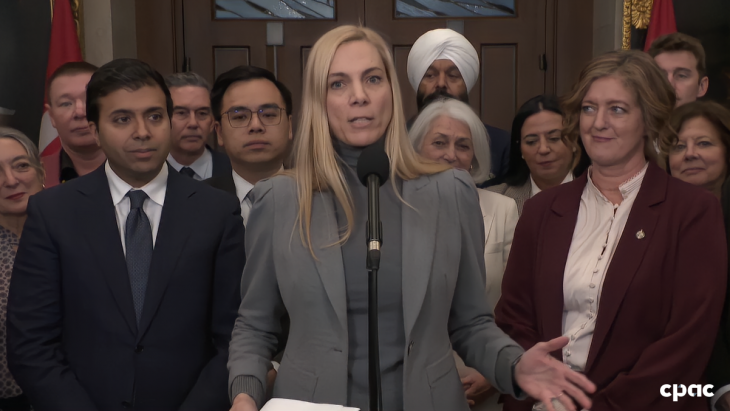
By Christopher Guly
OTTAWA — Canadian Heritage Minister Pascale St-Onge expects that a “growing sector” will emerge from the regulatory broadcasting framework the CRTC plans to release later this year in implementing the federal Online Streaming Act, Bill C-11.
“The reason why we created the CRTC and legislation around the Broadcasting Act was to make sure that Canadian content was easily found and accessible to Canadians, so [they[] could tell and watch their own stories,” she said Thursday at the Canadian Media Producers Association (CMPA) annual conference in Ottawa.
“The other part was making sure that there’s proper support so that we could create that great industry and make sure that all the proper infrastructures are in place – and all of this has been challenged with the arrival of the digital platforms,” which she noted “won’t regulate themselves.”
Bill C-11, the first major reform of the Broadcasting Act since it was introduced in 1991, passed Parliament and received royal assent last April.
At the time, Canadian Heritage said that it would require “streaming services to contribute to the creation, production and distribution of Canadian stories in a way that is flexible and fair” and “give Canadians more opportunities to see themselves in what they watch and hear, under a new framework that will lead to a modern definition of Canadian content that better reflects our country’s diversity.”
In her sit-down with CMPA president and CEO Reynolds Mastin and her first Prime Time appearance as Canadian Heritage minister, St-Onge – a musician who played bass in all-lesbian Montreal alternative rock band, Mad June, a decade ago – said she hoped that the “transformative effect” of C-11 will result in “more Canadian content on every platform available in Canada” and “Canadian diversity reflected in this content and on those platforms,” along with “a growing sector with good jobs and a good future.”
The minister said that the Online Streaming Act would also support intellectual property ownership for Canadian creators and ensure that all aspects of the industry “is included in what is considered Canadian content, whether it’s screenwriters, producers, actors, voices – all of it – need to be taken into account.”
C-11’s intent, she explained, “is to tell Canadian stories, and for that we need Canadian-branded talent.”
St-Onge said that last year’s prolonged strikes by both the Screen Actors Guild and American Federation of Television and Radio Artists (SAG-AFTRA) and the Writers Guild of America (WGA) illustrated the need for a strong industry in Canada.
An effusive fan of the Online Streaming Act, Mastin offered particular praise for its recognition of Indigenous content and voices as “one of the central pillars” of Canada’s broadcasting “ecosystem,” and asked St-Onge whether the Indigenous Screen Office – which he equated with Telefilm Canada and the Canada Media Fund in terms of its centrality within the industry — would receive further federal funding.
“I can’t really make an official announcement. But, you know – it’s gonna happen,” she said to wide applause.
“We’re extremely committed to reconciliation, and it’s not an easy road. But it’s a commitment that we’re making to future generations, and making dsu ethat Indigenous communities have the means and the capacity to tell their stories is essential to doing that.”
Sharing “common stories” of all Canadians – “our past, our present and our future” is the federal Liberals’ goal in its commitment to “sustain the industry,” said St-Onge, who prior to winning a seat in the House of Commons in 2021, served as president of the Montreal-based Fédération nationale des communications et de la culture, where – according to her cabinet biography – she “contributed to the implementation of policies and programs designed to help the media and cultural sectors adapt to shifts brought about by digital platforms.”
“If we want to have social cohesion – and be able to co-exist with all of our differences and diversity, we need to have common stories and share those cultural spaces in television, screen and music, which links us together,” she said.
Mastin also asked the heritage minister whether she could provide an update on the call she made last year for a redefining of CBC’s mandate, which would include a strong online presence for the public broadcaster.
Acknowledging that she has less than two years before the next federal election, scheduled for Oct. 25, 2025, St-Onge said she would rely on recommendations from an expert committee that she has assembled to map out the future of CBC/Radio-Canada, which would include drawing from best practices of public broadcasters from around the world.
Her goal is to protect the independence of CBC/Radio-Canada – “that its financ[ing] is stabilized, predictable, reliable, and that we help our public broadcaster face the crisis that all media is going through, and we need to make sure that it has a strong relationship with Canadians and that it’s a trusted and accountable media, and transparent with the highest standards of governance.”


